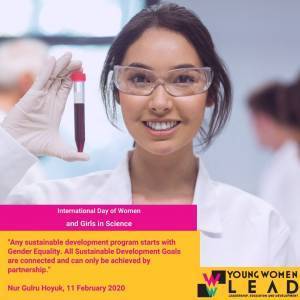
International Day of Women and Girls in Science
02/11/23
Register. External Link. Opens in new window.Equity, Diversity, and Inclusion Ignites Us
The International Day of Women and Girls in Science is the 11th day of February, by resolution of the United Nations General Assembly on 22 December 2015. The day recognizes the critical role women and girls play in science and technology.

“Any sustainable development program starts with Gender Equality. All Sustainable Development Goals are connected and can only be achieved by partnership.”
Less than 30 percent of researchers worldwide are women. According to UNESCO data only around 30% of all female students select STEM-related fields in higher education. Globally, female students’ enrollment is low (3 percent) in natural science, mathematics and statistics (5 percent) and in engineering, manufacturing and construction (8 percent). Long-standing biases and gender stereotypes are steering girls and women away from science related fields. As in the real world, the world on screen reflects similar biases—the 2015 Gender Bias Without Borders study. External Link. Opens in new window. by the Geena Davis Institute showed that of the onscreen characters with an identifiable STEM job, only 12 percent were women.
In order to achieve full and equal access to and participation in science for women and girls, and further achieve gender equality and the empowerment of women and girls, the United Nations General Assembly adopted resolution A/RES/70/212. External Link. Opens in new window. declaring 11 February as the International Day of Women and Girls in Science. External Link. Opens in new window..
Did you know?
- Women are typically given smaller research grants than their male colleagues and, while they represent 33.3% of all researchers, only 12% of members of national science academies are women.
- In cutting edge fields such as artificial intelligence, only one in five professionals (22%) is a woman.
- Despite a shortage of skills in most of the technological fields driving the Fourth Industrial Revolution, women still account for only 28% of engineering graduates and 40% of graduates in computer science and informatics.
- Female researchers tend to have shorter, less well-paid careers. Their work is underrepresented in high-profile journals and they are often passed over for promotion.
